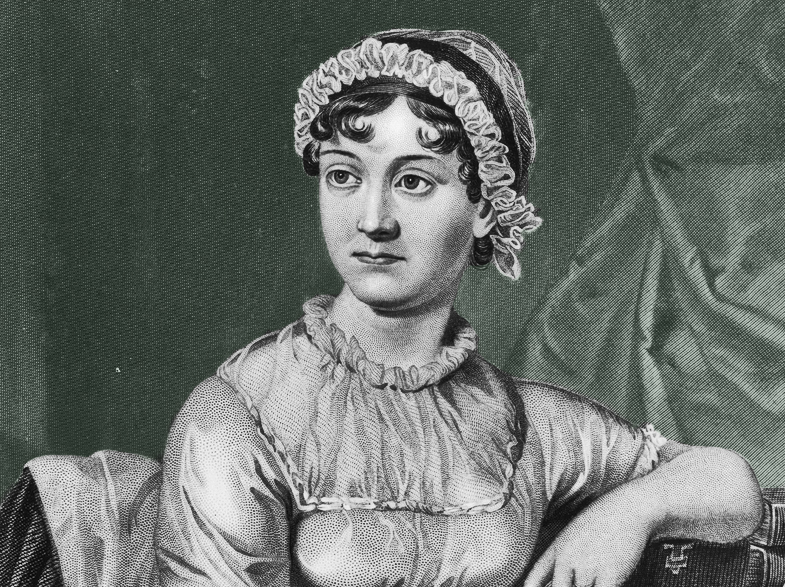
Jane Austen spent her final eight years in the tiny village of Chawton, where her older brother Edward had a large manor house and garden. There she lived with her older sister Cassandra in one of Edward’s cottages. Below, Jane writes to Cassandra while visiting her brother Henry at his residence at 64 Sloane Street, in Knightsbridge (now part of London). A letter from Jane to Cassandra must always be read as the work of two authors: after Jane’s death, Cassandra censored (and in some cases, destroyed) letters she received from Jane in order to prevent others from reading them. Still, today’s letter, with its easy tone and attention to minutiae, reflects the intimacy the two sisters must have enjoyed. Everything was important enough to be told to Cassandra, including the details of travel, the overheard conversations, and the visitors’ hairstyles.
Sloane Street, Thursday, May 20, [1813]
My dear Cassandra, —Before I say anything else, I claim a paper full of Halfpence on the drawing-room mantelpiece; I put them there myself, and forgot to bring them with me. I cannot say that I have yet been in any distress for money, but I choose to have my due, as well as the Devil. How lucky we were in our weather yesterday! This wet morning makes one more sensible of it. We had no rain of any consequence. The head of the curricle was put half up three or four times, but our share of the showers was very trifling, though they seemed to be heavy all round us, when we were on the Hog’s-back, and I fancied it might then be raining so hard at Chawton as to make you feel for us much more than we deserved. Three hours and a quarter took us to Guildford, where we stayed barely two hours, and had only just time enough for all we had to do there; that is, eating a long and comfortable breakfast, watching the carriages, paying Mr. Harrington, and taking a little stroll afterwards. From some views “which that stroll gave us, I think most highly of the situation of Guildford. We wanted all our brothers and sisters to be standing with us in the bowling-green, and looking towards Horsham. I was very lucky in my gloves,—got them at the first shop I went to, though I went into it rather because it was near than because it looked at all like a glove-shop, and gave only four shillings for them; after which everybody at Chawton will be hoping and predicting that they cannot be good for anything, and their worth certainly remains to be proved; but I think they look very well. We left Guildford at twenty minutes before twelve (I hope somebody cares for these minutiae), and were at Esher in about two hours more. I was very much pleased with the country in general. Between Guildford and Ripley I thought it particularly pretty, also about Painshill; and from a Mr. Spicer’s grounds at Esher, which we walked into before dinner, the views were beautiful. I cannot say what we did not see, but I should think there could not be a wood, or a meadow, or palace, or remarkable spot in England that was not spread out before us on one side or other. Claremont is going to be sold: a Mr. Ellis has it now. It is a house that seems never to have prospered. After dinner we walked forward to be overtaken at the coachman’s time, and before he did overtake us we were very near Kingston. I fancy it was about half-past six when we reached this house,—a twelve hours’ business, and the horses did not appear more than reasonably tired. I was very tired too, and glad to get to bed early, but am quite well to-day. I am very snug in the front drawing-room all to myself, and would not say “thank you” for any company but you. The quietness of it does me good. I have contrived to pay my two visits, though the weather made me a great while about it, and left me only a few minutes to sit with Charlotte Craven. She looks very well, and her hair is done up with an elegance to do credit to any education. Her manners are as unaffected and pleasing as ever. She had heard from her mother to-day. Mrs. Craven spends another fortnight at Chilton. I saw nobody but Charlotte, which pleased me best. I was shown upstairs into a drawing-room, where she came to me; and the appearance of the room, so totally unschoollike, amused me very much: it was full of modern elegances.
Yours Affectionately,
J.A.
From: The Letters of Jane Austen / Selected from the compilation of her great nephew, Edward, Lord Bradbourne.
FURTHER READING
Read Jane Austen’s History of England, written at age 15.
Was Jane Austen a moralist more than a romantic? Read Gilbert Ryle’s philosophical essay, originally published in the Oxford Review.
Read about the excavation of Jane Austen’s childhood home.


